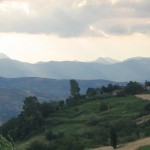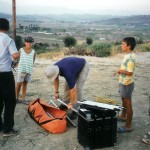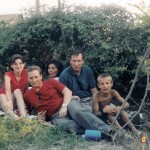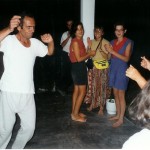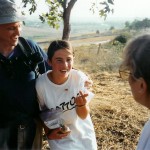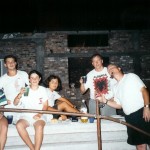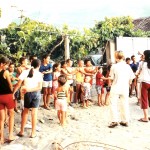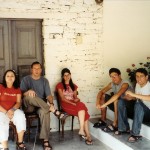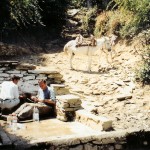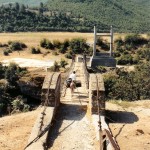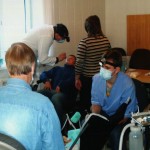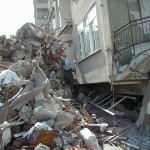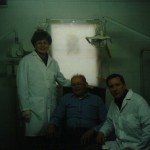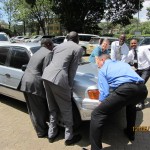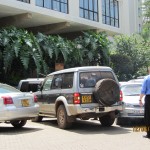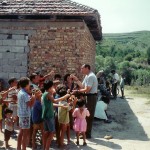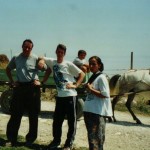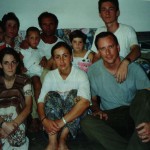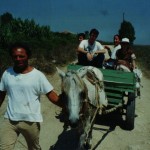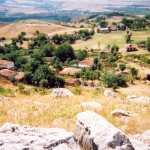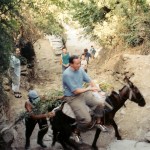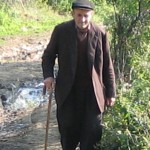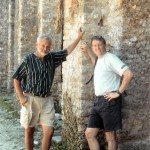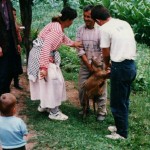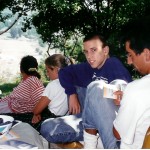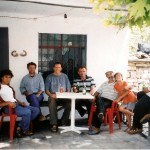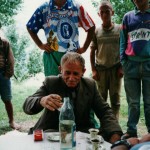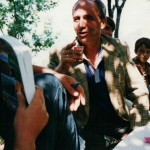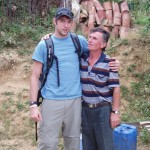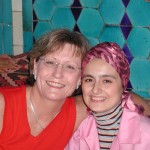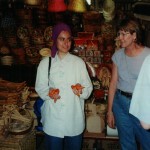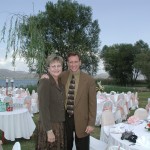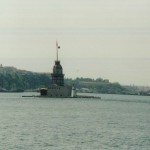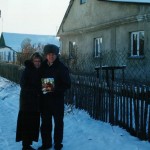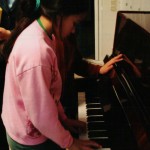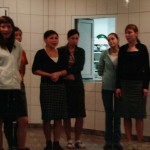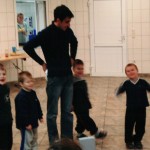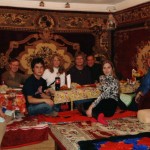Sometimes You Just Got To Keep Going
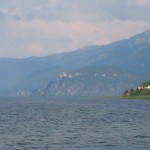 Have you ever planned to do something that you were just positive was the right thing to do only to find when you got started that nothing was going right? At those times you start to second guess yourself wondering if you misinterpreted the circumstances, or were acting out a role meant for someone else. You contemplate cutting your loses and quitting, feeling deep down that if you were actually supposed to be doing this thing that it would be a whole lot easier, and without all the obstacles. It is what you do at that moment that is often a life defining experience. Whatever your decision is at this crossroad you will always have a tendency to fall back on that decision and repeat it. I am constantly having to be reminded of a Proverb that says, “A man of integrity will do what is right even when it hurts.” I have tried to instill this teaching in my kids, but ultimately it still falls to me to persevere when things don’t go as planned.
Have you ever planned to do something that you were just positive was the right thing to do only to find when you got started that nothing was going right? At those times you start to second guess yourself wondering if you misinterpreted the circumstances, or were acting out a role meant for someone else. You contemplate cutting your loses and quitting, feeling deep down that if you were actually supposed to be doing this thing that it would be a whole lot easier, and without all the obstacles. It is what you do at that moment that is often a life defining experience. Whatever your decision is at this crossroad you will always have a tendency to fall back on that decision and repeat it. I am constantly having to be reminded of a Proverb that says, “A man of integrity will do what is right even when it hurts.” I have tried to instill this teaching in my kids, but ultimately it still falls to me to persevere when things don’t go as planned.
It would be best, at this point, to begin my story with how things were planned to go. The goal was to go by myself and set up a dental clinic in a Gypsy community in Korça, Albania with my friend Ardi who is an Albanian dentist from Tirana, Albania. I was planning on flying United to Chicago, and connect to fly to Washington D.C., and from there fly to Milan, Italy, and then into Tirana. From there Ardi and I were planning to drive to Korça in the southeast part of the country, which before the roads were improved used to take about five hours. That was the plan.
The plan, however, began to crumble before I even left Wichita. My wife, Karen dropped me off at the airport on a Sunday morning, and then went to church. I checked into my United Airlines flight to Chicago about two hours early as is customary when international flights are part of the itinerary, but when I arrived at my gate I noticed that my aircraft was not present. I didn’t think too much about it until I realized that there was still no plane and the departure time was in fifteen minutes. The aircraft finally arrived, people disembarked, hope was building. My departure time came and went, and finally after twenty minutes a United employee informed us that the flight was cancelled due to the fact that because the flight was so late the crew had timed out and could not fly again, and there was no other crew available. I had traveled enough to know that these things happen, but the problem was that I needed to catch a flight from Washington D.C. by 5 PM to fly to Milan. I casually stood in the now long line of fairly cranky people waiting to talk to the airline representative. When I finally reached the counter I did everything I could to remain calm and nice while I explained to her that I needed to catch a flight in Washington D.C. at 5 PM to Milan. She looked over my documents, and said she would do her best to get me to Washington on time. She then took my ticket and rerouted me through Denver, Colorado explaining to me that the flight for Denver was leaving in just fifteen minutes. From there I would have a ticket to Washington D.C. waiting for me at the United service counter.
I ran to the Denver gate knowing the chances that my luggage and equipment making this flight was pretty small. I was the last to board before the doors were closed. I don’t know about you, but I have always hated flying in the opposite direction from where I am going, and Denver is a little over four hundred miles in the wrong direction. When I arrived at the United service desk to get my ticket to Washington D.C. the United representative looked at me as if I had a booger hanging out of my nose or something. They had no idea of what I was talking about. It seems the Wichita person got so busy with other customers that she forgot to contact the Denver people and tell them I needed a ticket to Washington. This was before e-tickets. The Denver people politely informed me that they had no seats available on this flight, but that I could catch one later on in the evening. Of course that wasn’t going to work, but I remained calm and nice, and asked them to let me know if there was a cancellation because flights from Milan to Tirana were only a couple of times a week, which meant I wasn’t going to get to Albania until the end of the week.
It wasn’t the first time I had prayed, but I prayed at that moment that something would be worked out. The flight to Washington was beginning to board, and I looked anxiously toward the attendant who then motioned for me to come over. I was so excited when I was handed a ticket in first class, and thanked God immediately. As I was waiting in line in the gangway I heard my name being mispronounced in a way that I had never heard before from a United attendant who was pushing through the line from behind to reach me. He apologized profusely that a mistake had been made, and that I would not be sitting in first class, but—yes, you may have guessed it—in the very back row next to the toilets in the seats that don’t recline. At this point I was thankful for a seat, and barring any other problems I would make it to Washington D.C. in time to connect with my flight to Milan.
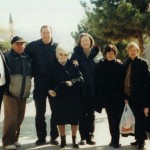 When I arrived in Tirana I found that my friend Ardi was not feeling well, but he was still game enough to go with me to Korça. I had left all the arrangements to him since he said he had a place to stay in Korça with an uncle. I had planned to meet the father of a friend of mine who was in our English Club in Wichita. His father, Qani (pronounced, Chany), lived in a town on the way to Korça, and Ardi and I were to meet up with him for lunch. I had spent time with Qani before and it was great to see him again. He was excited to hear news about his son and family back in the States. He wanted to take us to a restaurant along the shores of Lake Orhid so that we could eat Koran, a trout found only in this lake and one other lake in Russia. As we entered the restaurant Ardi began to feel even worse and asked Qani if he could take me the rest of the way to Korça while he went on a head to rest at his uncle’s house. This was perfectly fine with both of us. The only problem was that Qani spoke no English, and I only spoke a little Albanian, but we were both great at Charades. After lunch Qani said he had to do some business back in his town and asked if I could wait for him at the restaurant.
When I arrived in Tirana I found that my friend Ardi was not feeling well, but he was still game enough to go with me to Korça. I had left all the arrangements to him since he said he had a place to stay in Korça with an uncle. I had planned to meet the father of a friend of mine who was in our English Club in Wichita. His father, Qani (pronounced, Chany), lived in a town on the way to Korça, and Ardi and I were to meet up with him for lunch. I had spent time with Qani before and it was great to see him again. He was excited to hear news about his son and family back in the States. He wanted to take us to a restaurant along the shores of Lake Orhid so that we could eat Koran, a trout found only in this lake and one other lake in Russia. As we entered the restaurant Ardi began to feel even worse and asked Qani if he could take me the rest of the way to Korça while he went on a head to rest at his uncle’s house. This was perfectly fine with both of us. The only problem was that Qani spoke no English, and I only spoke a little Albanian, but we were both great at Charades. After lunch Qani said he had to do some business back in his town and asked if I could wait for him at the restaurant.
I waited for over two hours for Qani to return. I began to worry that something had happened to him. I began to realize just how vulnerable I was. I had no minutes on my cell phone yet, no automobile, and no command of the language. I prayed again, and finally Qani arrived and drove me the rest of the hour and a half to Korça.
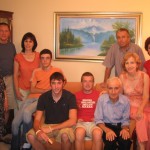 I went into a store and bought minutes for my phone, and called Ardi. He still had a head ache, but was resting. He then asked where I was staying…What??? I said I thought I was staying with him to which he replied that since I had friends in Korça—again family members from my English Club—he assumed I already had a place to stay and when he said he would make arrangements he meant he would make arrangements for himself, and that I didn’t need to worry about him. Isn’t language differences GREAT! I quickly called my non-English speaking friend Imi, who has family in our English Club. Imi was surprised to hear from me since he had been told by his sister in America that I had made other arrangements. I told him of my predicament, and he cordially invited me to stay in his home. Ardi and I arranged to meet at a statue near his uncle’s house the next morning so we could go set up the clinic in the Gypsy community.
I went into a store and bought minutes for my phone, and called Ardi. He still had a head ache, but was resting. He then asked where I was staying…What??? I said I thought I was staying with him to which he replied that since I had friends in Korça—again family members from my English Club—he assumed I already had a place to stay and when he said he would make arrangements he meant he would make arrangements for himself, and that I didn’t need to worry about him. Isn’t language differences GREAT! I quickly called my non-English speaking friend Imi, who has family in our English Club. Imi was surprised to hear from me since he had been told by his sister in America that I had made other arrangements. I told him of my predicament, and he cordially invited me to stay in his home. Ardi and I arranged to meet at a statue near his uncle’s house the next morning so we could go set up the clinic in the Gypsy community.
The next morning I walked to the statue and waited. I noticed that Ardi’s car was not in front of his uncle’s house, but I just assumed he had parked it off the street somewhere. So I waited… and I waited… and I waited. I finally called Ardi on his cell only to get his uncle who spoke no English, but I knew enough Albanian to figure out that Ardi had fallen down the stairs the night before, and was in the hospital, and that he would not be able to help me.
To say I prayed implies that I quietly implored the God I have put all my faith in to help me. So I won’t say I prayed. What I did was I sat down on the base of that bird-poop covered statue, and basically had a little melt-down to my Heavenly Father. I was speaking out loud and had many passers-by stare at me as if I was a raving lunatic babbling in a strange language. I vented that from the very beginning this trip had been a disaster, and that I thought God had wanted me to do it, but obviously He didn’t, and that if things didn’t get better, I was going to go home. I had no sooner finished my little temper tantrum, when another friend Dori, who worked with Campus Crusade for Christ drove by, recognized me, and asked if I needed help. I told him what I was doing and what had happened to Ardi, and that I needed a ride to the Gypsy village. I hadn’t even contacted Dori that I was coming to Albania.
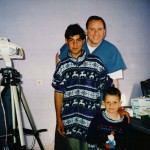 WOW! An instantaneous answer to prayer despite my whiny attitude. But, hey, it is not about me. It is about God and His Glory—see earlier posts on that subject. Dori helped me set the clinic up. He introduced me to the leaders of the community, and he stayed with me until I was settled in. He and his wife, Sabina, even invited me to stay with them for the next three nights. As it turned out this was one of the most productive missions I have had. It was during this time that I was able to take part in the Gypsy music that one night I told the story about in the post, Under the Stars at Night.
WOW! An instantaneous answer to prayer despite my whiny attitude. But, hey, it is not about me. It is about God and His Glory—see earlier posts on that subject. Dori helped me set the clinic up. He introduced me to the leaders of the community, and he stayed with me until I was settled in. He and his wife, Sabina, even invited me to stay with them for the next three nights. As it turned out this was one of the most productive missions I have had. It was during this time that I was able to take part in the Gypsy music that one night I told the story about in the post, Under the Stars at Night.
I learned a lot during that trip. For one thing I learned that I needed to learn more Albanian. I learned from then on that I needed to charge my cell phone with minutes as soon as I arrive in country. I learned how to keep my head in tough situations. I learned that I can never take anything for granted, and that I must always depend on God to accomplish His mission through me. I also learned that God never promised that serving Him was going to be easy. In fact, He promised that it is going to be hard. My friend Ardi remained in the hospital for the duration of the time I was in Korça, but in the end he recovered completely. The adversity during this mission was just another building block in my foundation. I don’t think I would have wanted it any other way—except for Ardi getting hurt of course.
May God Bless you until next time!

